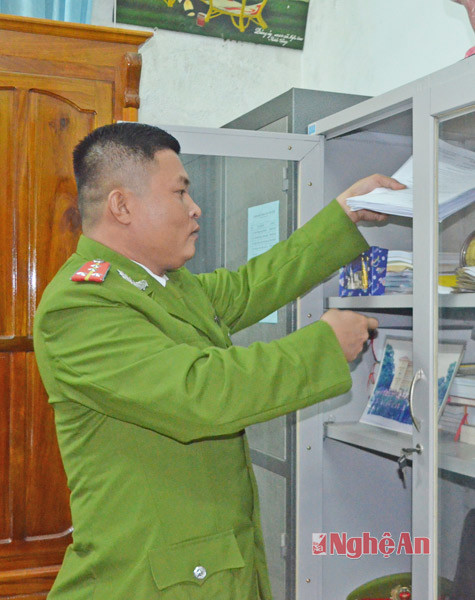"Difficulties and hardships must come first"
(Baoghean) -"A police officer who is devoted to the Party and the people is someone who always faces all difficulties and challenges." Thinking so, Major Phan Viet Phuc always volunteers to take on the most arduous and dangerous tasks in the reform and detention work at Nghi Kim Detention Camp (Vinh City).
 |
| Major Phan Viet Phuc. |
Major Phan Viet Phuc (born in 1977) in Mau Don Commune (Hung Loc, Vinh City) comes from a family with a tradition of being a police officer, so from a young age the image of a people's police officer permeated him through the daily stories of his parents and his beloved sister. After graduating from the People's Police Academy, Phan Viet Phuc joined the army as a prison guard at Detention Camp No. 6 from 1996 to 2003.
In 2003, he was assigned to work at Nghi Kim Detention Center by his superiors. There are more than 1,000 prisoners, but only 15% of them are being reformed and detained, the rest are being held pending trial. He and his colleagues liken the work of a prison guard to a second hand, working tirelessly with a schedule that repeats itself day after day.
However, that does not mean we can be subjective or negligent because if an incident occurs such as a prisoner escaping from prison, going on a hunger strike or trying to harm himself or leaking information that affects the investigation and interrogation process, the responsibility of the prison warden is very heavy and stressful. Therefore, it requires a police officer who does reform and detention work like him to know how to combine firmness and gentleness, to be both resolute and gentle, to be observant and always be vigilant. If only doing prison warden work in a normal cell, the danger is always lurking, but in a serious crime cell, the danger is multiplied. In previous years, the Board of Directors always rotated the officers on duty at this cell, but for the past 3 years, Phan Viet Phuc has always been assigned to be on duty here because he simply thinks he is the right person for this role.
The serious crime cell is for those who have committed serious crimes with the death penalty. That means when entering this cell, the prisoners are sure of the highest sentence, so most of them are depressed or rebellious and are easily agitated, even rebelling, trying to escape from prison. Once, Dang Dinh Hung from Dong Ngac - Tu Liem - Hanoi was detained here for the crime of illegal drug trafficking and possession. When arrested, Hung knew he would have to face the highest sentence, so he was depressed and dissatisfied, and many times Hung tried to commit suicide.
Once the subject bit his tongue to commit suicide, but thanks to his quick wit, Major Phuc successfully stopped the bleeding for the subject while waiting for the medical team to arrive. In the following days, he spent time close to, talking to, and encouraging Hung, and gradually the subject understood and no longer resisted, did not self-harm, and strictly followed the camp's regulations. In many cases, dangerous prisoners were willing to use sharp weapons, chains, and even items in the cell to attack officers. Once, he was attacked by a subject with a stick, causing him to injure his head.
At times like that, Major Phuc had to use all his abilities and professional measures to calm the subject and above all, directly understand the psychological developments to talk, dialogue, and reform the subject. He confided: “For a prison guard, first of all, one must skillfully use the 4-know method: Know the name, know the face, know the relatives, and know the crime of the subject to find the most appropriate method for the subjects he is managing. For example, talking and confiding to reduce the stress of the subject or sharing to have gestures and words of encouragement so that the subject has more hope and serves the detention sentence well while awaiting trial.”
Every time he met a prisoner, he would ask: "Did you sleep well?" or "Are you still tired?"... to create a friendly atmosphere and gain their trust and guidance, even though it was just a belated repentance.
Major Phan Viet Phuc always kept in mind that "Following the 6 teachings of Uncle Ho to the people's police, forgetting oneself for the country and serving the people means knowing how to face all difficulties and hardships", that always permeates his mind, thoughts and actions. It is also the guiding principle that helps him continue on the path and noble ideals that he has chosen.
TN
